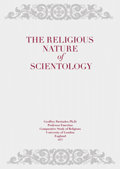If Scientology is compared with secular organisations the religious nature of some of its beliefs soon becomes clear, even if it has not yet developed a complex theology. It is quite different from political societies which have no specific interest in immortal souls. Similarly it differs from social clubs, like the Oddfellows or the Loyal United Order of Anglo-Saxons. It is more akin to Freemasonry which has beliefs in God, the divine Architect, and in spiritual beings. But Freemasons have often said that their organisation is not a religion. In much of Europe, at least until recently, Freemasonry was strongly anticlerical, a sort of irreligious religion. But in Great Britain and the United States Freemasons have often also been members of established churches and have wished to show that they do not follow a rival religion, but rather a moral code and a support of true religion.
Further brief reference may be made to ancient and modern religious movements. The Jains of India believe in many souls but not in God, yet they are counted as a religion. The Buddhists believe neither in a supreme God nor in a describable soul, though there are differences between theory and practice, but they are one of the major world and missionary religions. Many Hindu thinkers of Vedanta are non-dualists, believing that human and divine are one, since the individual soul is the universal soul. This is not God, in the Christian or Western legal sense, yet Hinduism is a major religion. In modern times Indian Neo Vedanta has had a wide influence in Europe and America, for its teachings have differed both from the rigid dogma of most Western religion and also from the materialism of much modern science.
The Founder and Aims declare that the purpose is to free man from the bondage that “sought to reduce him to the status of cells, brain and body, a ‘scientific’ lie which has caused untold damage to man and which, unless corrected, will eventually result
in total annihilation”.
Scientology appears to have adopted from the outset and as a basic doctrine a spiritual attitude to life. The Founder and Aims declare that the purpose is to free man from the bondage that “sought to reduce him to the status of cells, brain and body, a ‘scientific’ lie which has caused untold damage to man and which, unless corrected, will eventually result in total annihilation”.
And again, “that man is primarily a spirit, immortal and basically indestructible”.





























